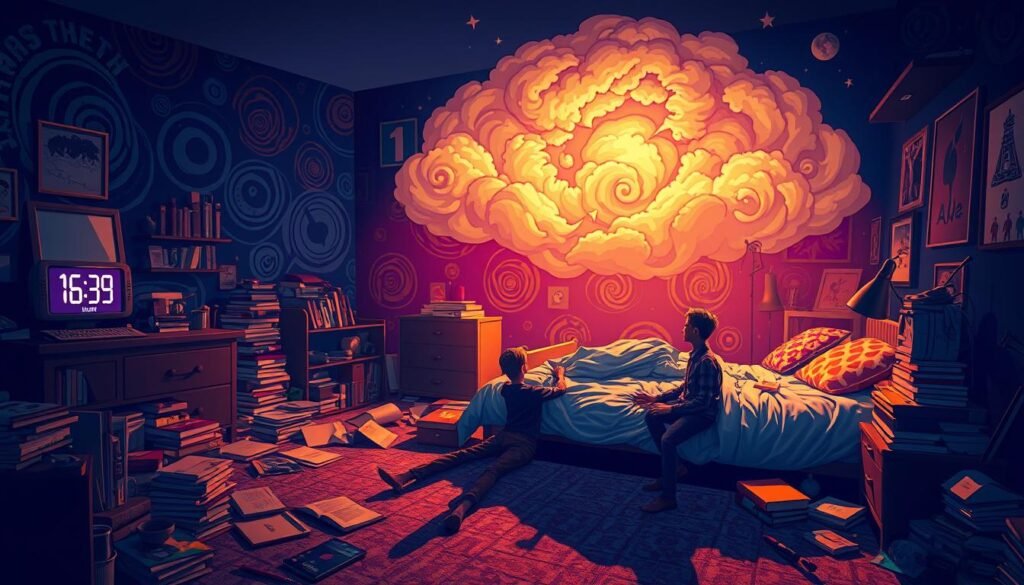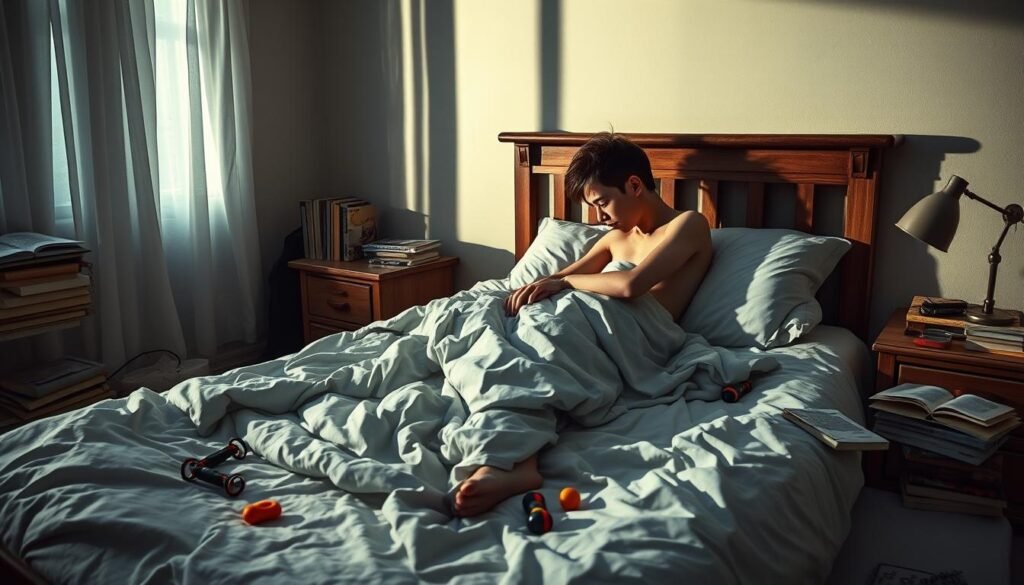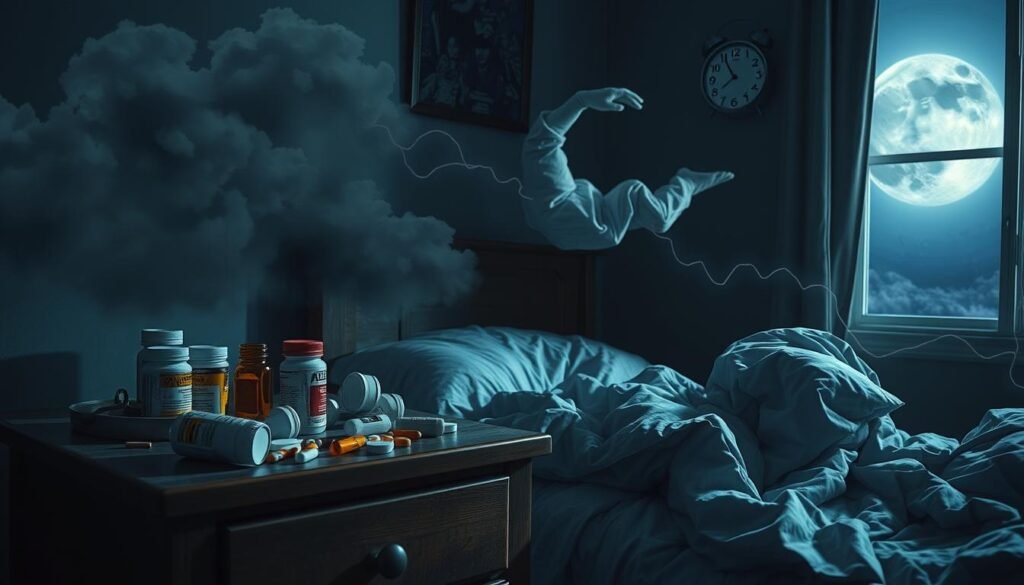Surprisingly, 67% of people with ADHD find it hard to sleep well at night. This fact highlights a big issue for those dealing with Attention-Deficit/Hyperactivity Disorder (ADHD). It shows how it affects their sleep. Studies show ADHD can cause various sleep disorders, especially insomnia. This happens due to medication side effects and typical ADHD symptoms.
The mix of day problems and night struggles can greatly lower life quality. This brings up an important question: can ADHD cause insomnia?
Key Takeaways
- ADHD can significantly impact sleep quality and patterns.
- A high percentage of individuals with ADHD experience insomnia.
- Sleep-disordered breathing problems, including sleep apnea, are common in ADHD patients.
- Restless Legs Syndrome is prevalent among those with ADHD, affecting sleep.
- Medication prescribed for ADHD can often lead to sleep challenges.
Understanding ADHD and Its Symptoms
ADHD stands for Attention-Deficit/Hyperactivity Disorder. It is a brain-based condition mostly found in childhood. People with ADHD often find it hard to focus, act impulsively, and may be very active.
This disorder can affect how well someone does in school, their relationships, and how they feel. About 5.3% of young people around the world deal with these challenges. The problems can continue into adulthood, affecting life in many ways.
ADHD can also make it hard for people to sleep well. Between 25-55% of people with ADHD experience problems with sleeping. It’s important to recognize these sleep issues to manage them effectively, which includes trouble falling or staying asleep.
There are several ways to help manage these issues. Therapies like Cognitive Behavioral Therapy for Insomnia (CBT-I) have been helpful. For more information on ADHD and sleep, you can visit this link.
What is Insomnia?
Insomnia is a sleep problem where people have trouble falling or staying asleep. This often results in not getting enough restful sleep. Those with insomnia might feel tired and cranky during the day. This condition can be short-term or long-lasting, affecting daily life differently. It’s very important for anyone with sleep disorders like ADHD to understand how insomnia affects them.
About 70 million Americans deal with insomnia each year. This condition is not just about lacking sleep. It also leads to problems like emotional ups and downs, thinking issues, and a drop in life quality. Insomnia can make mental health problems worse due to its effect on emotions and stability.
People with ADHD often have a hard time sleeping. Sleeping problems can make ADHD symptoms stronger, creating a tough cycle to break. This cycle can continue into adulthood. For those looking for more details on how these issues connect, check out ADHD and its relationship with sleep. It sheds light on how these problems intertwine.
The Link Between ADHD and Sleep Disorders
Studies have found a strong link between ADHD and trouble sleeping. About 25% to 55% of kids with ADHD don’t sleep well. They often face insomnia, which makes it hard to fall asleep or stay asleep. This leads to more issues during the day.
ADHD often comes with irregular sleep patterns and being too alert. Kids with ADHD take longer to fall asleep. Anxiety and depression can make these sleep problems worse.
Brain scans show differences in those with ADHD and sleep disorders. They have less gray matter in some areas of the brain. This affects neurotransmitters like dopamine and norepinephrine, linking ADHD to sleep issues.
To manage ADHD and insomnia, a regular bedtime is key. Reducing screen time before bed also helps. These actions can improve sleep and might reduce ADHD symptoms.
It’s important to understand how ADHD and sleep issues are connected. Spotting and treating these problems early can greatly improve life quality.
ADHD’s Influence on Sleep Patterns
ADHD can really affect how well someone sleeps. Over 70% of folks with ADHD have troubles like insomnia. Many kids with ADHD face sleep issues. Sadly, these problems often follow them into adulthood. This makes getting good sleep hard for those with ADHD.
Getting to sleep can be tough for people with ADHD. They often feel more awake at night. Many say they’re “night owls” and can’t stick to a bedtime. This can make ADHD symptoms worse during the day, like being irritable or tired.

Medicines for ADHD, such as Ritalin and Adderall, might disrupt sleep too. Taking them later in the day can make falling asleep hard. Melatonin supplements are a popular way to help people with ADHD sleep better.
Cognitive behavioral therapy for insomnia (CBT-I) is a great way to improve sleep without medicine. It helps people change thoughts and actions that mess up their sleep. This therapy tackles the root causes of sleep problems.
People with ADHD are also more likely to have sleep apnea, which stops you from breathing right when you sleep. It’s tough dealing with ADHD and sleep issues together. But, finding good solutions is important.
| Sleep Problem | Prevalence Among Individuals with ADHD |
|---|---|
| Insomnia | 70% |
| Restless Sleep | 70% |
| Sleep Disorders in Children | 50% |
| Obstructive Sleep Apnea | Higher Risk |
| Benefits of Melatonin Supplements | Facilitates Sleep Onset |
| Cognitive Behavioral Therapy (CBT-I) | Improves Sleep Habits |
Knowing how ADHD affects sleep helps find the right solutions. Doing things like setting a sleep schedule, cutting down screen time at night, and making your bedroom cozy can help. These steps can tackle some sleep issues linked to ADHD.
Can ADHD Cause Insomnia?
Many studies have looked into how ADHD might affect sleep, especially insomnia. These studies show that people with ADHD often struggle with sleeping well. This link between ADHD and sleep problems is important to understand.
Research Evidence on ADHD and Insomnia
Children with ADHD are more likely to have trouble sleeping. About 19.3% of them face moderate to severe sleep issues weekly. For those on ADHD medication, 29% find it hard to fall asleep every night. It takes them over 30 minutes. But, only 10% of kids not on medication have this issue.
Some kids get special help and medicine during summer programs. Here, 61% say they have trouble falling asleep, getting about seven hours of sleep a night. Kids with ADHD take longer to fall asleep and don’t sleep as well through the night. Tests show they get less deep sleep than other kids. This makes them very tired during the day. Among adults, 43% to 85% have symptoms of insomnia. This shows we need good treatments for those with ADHD and insomnia.
Statistics on Sleep Problems in ADHD Individuals
Looking at the numbers helps us see the big picture. Between 6% and 15% of all adults have trouble sleeping. Yet, nearly 80% of adults with untreated ADHD struggle with sleep. Women with ADHD seem to have more sleep problems. Other mental health issues can make sleep even harder for people with ADHD. This shows why it’s so important to find the right treatments.
| Population | Prevalence of Insomnia Symptoms | Prevalence of ADHD |
|---|---|---|
| General Adult Population | 6% – 15% | 2% – 3% |
| Adults with ADHD | 43% – 85% | 40% – 60% (persistent into adulthood) |
| Children with ADHD | 19.3% (moderate-to-severe problems) | 29% (stimulant-treated with insomnia) |
Common Sleep Disorders Associated with ADHD
Sleep disorders commonly affect those with ADHD, touching lives of both kids and adults. Knowing about these disorders sheds light on how ADHD and sleep issues affect everyday life.
Insomnia and Its Impact
For people with ADHD, insomnia is a big problem. It leads to tiredness, crankiness, and poor performance in daily tasks. This issue can make ADHD symptoms worse, making hard for individuals to get through the day.
Many people with ADHD find it hard to calm down and follow a bedtime routine. They also struggle to quiet their minds before sleep.
Sleep Apnea in ADHD Patients
Sleep apnea disrupts the sleep of many with ADHD, causing breaks in sleep and trouble breathing at night. It can make it harder to focus and worsen ADHD symptoms, creating a vicious cycle. Up to 25% of people with ADHD might have obstructive sleep apnea, showing how connected these issues are.
Restless Legs Syndrome (RLS) and ADHD
Restless Legs Syndrome (RLS) is another common sleep issue among those with ADHD. Around 44% of ADHD individuals report RLS symptoms, leading to disturbed sleep.
This condition worsens the quality of sleep and adds to the challenge of getting enough rest.

Factors Contributing to Sleep Issues in ADHD
Many things make sleeping hard for people with ADHD. One big issue is stimulant medications used to manage ADHD. These drugs can make people more awake and active. This makes it tough for them to relax and fall asleep at night.
Other mental health problems can also affect how well they sleep. A lot of people with ADHD also deal with anxiety or depression. These issues can disrupt their sleep further. It’s important to understand and tackle these problems.
Bad habits can make sleeping even harder. Things like not having a regular bedtime and using phones or computers late at night can make insomnia worse. It helps to have a regular bedtime routine to sleep better.
Studies show that about two-thirds of individuals with ADHD face sleep problems. Between 25-50% of these people have different sleep disorders, with insomnia being the most common. This shows how critical it is to know what makes sleeping difficult for those with ADHD.
ADHD Medications and Sleep Challenges
ADHD meds, especially stimulants, can mess up sleep. About 30% of children with ADHD can’t sleep well because of them. They need over 30 minutes to fall asleep. Only 10% of children not on meds face this issue. Methylphenidate, a stimulant, delays sleep by 40 minutes. This shows how big an impact these meds have.
Higher doses of methylphenidate lead to more sleep problems. At 18 mg, 8.5% of children have sleep issues. This number jumps to 25% at 54 mg. Still, these meds significantly help 75% of children with ADHD. This makes choosing the right treatment hard for doctors. They have to balance sleep issues with improving health.
ADHD challenges like managing time can worsen sleep issues, like too much sleep or waking up a lot at night. ADHD folks more often have Sleep Disordered Breathing and Restless Legs Syndrome. In fact, 44% of people with ADHD have Restless Legs Syndrome. Only 2% without ADHD do.
Melatonin might help with sleep issues from ADHD meds. Taking 3 to 5 mg about 30 minutes before bed is the advice. This can help with sleep problems and create better sleep routines.
About 80% of adults with ADHD have sleep disorders like insomnia too. So, it’s important for doctors to watch their patients’ sleep. They need to adjust meds to help them sleep better. For more on sleep issues like insomnia, here’s a link to learn about its health risks.

Effective Sleep Strategies for ADHD
Good sleep strategies for ADHD are key to fighting insomnia. Starting a bedtime routine helps create structure and calm at night. This routine tells your body it’s time to sleep.
Creating a Calming Bedtime Routine
A bedtime routine for ADHD could include calming activities. Things like reading, soft music, or deep breathing help prepare for sleep. It’s important to do the same actions each night for consistency.
This repetition helps your body recognize it’s time to sleep. Try to have a routine that’s 30 to 60 minutes long before bed. Here are ideas:
- Set a regular bedtime and wake time.
- Limit stimulating activities before bed.
- Practice relaxation techniques like meditation and breathing exercises.
- Create a soothing environment with dim lighting.
- Avoid electronics at least one hour before sleep.
Improving Sleep Hygiene
Good sleep hygiene can improve sleep quality. For those with ADHD, it’s essential to have a bedroom that helps you sleep. Keep the room quiet, dark, and cool. A regular sleep schedule is also crucial.
Here are some tips to sleep better:
- Keep the bedroom free from distractions.
- Limit caffeine intake four hours before bedtime.
- Avoid alcohol and nicotine close to bedtime.
- Engage in regular physical activity during the day.
- Consider utilizing relaxation programs to aid sleep.
When to Seek Professional Help for Sleep Issues
People with ADHD often have trouble sleeping. This can include issues like long-term insomnia or sleep apnea. Getting help for ADHD-related sleep problems can really improve your life day-to-day.
It’s important to see a healthcare provider to figure out the sleep issue. They use tools like sleep diaries to understand your sleep better. This helps them make a good plan for you to sleep better.
Getting help early is key. It stops other health problems that come from not sleeping well. Going for professional help for insomnia helps people sleep better and feel better overall.
Changing your lifestyle and being smart about your meds can make sleeping easier. But, be careful with sleep aids from the store. They might not mix well with ADHD meds. Relaxation methods can also help.
About one in four people with ADHD struggles to get enough sleep. Knowing when to get help is very important. Taking steps early leads to a healthier life and better daily function.
Conclusion
The link between ADHD and insomnia is complex and common. It affects roughly 3%–5% of young people and around 3% of adults in the U.S. Studies show that 25%–50% of people with ADHD face sleep issues. This includes a high rate of insomnia: 73.3% in kids and 66.8% in adults with ADHD.
Understanding this connection is key. It can greatly impact how someone functions each day and their overall health.
New research underlines how important it is to address these sleep problems. This can enhance the life quality of those with ADHD. Managing these issues involves changes in behavior and getting the right help. Seeking support is crucial for better sleep.
In short, increasing awareness of ADHD and sleep troubles is important. It helps in finding good solutions. Looking at what causes sleep disorders in ADHD can lead to improved sleep.
This, in turn, boosts mental and physical health. For more info on how long-term sleep issues affect health, click here.